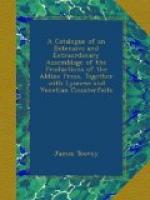Poor Chatterton, in his “Tragedy of Ella,” refers to the daisy in the line:
“In daiseyed mantells is the mountayne dyghte.”
Hervey, in his “May,” describes
“The daisy singing in the grass
As thro’ the cloud the star.”
And Hood, in his fanciful “Midsummer Fairies,” sings of
“Daisy stars whose firmament is green.”
Burns, whose “Ode to a Mountain Daisy” is so universally admired, gives, besides, a few brief notices of the daisy:
“The lowly daisy sweetly blows—”
“The daisy’s for simplicity
and unaffected air.”
Tennyson has made the daisy a subject of one of his most unsatisfactory poems. In “Maud,” he writes:
“Her feet have touched the meadows
And left the daisies rosy.”
To Wordsworth, the poet of nature, the daisy seems perfectly intelligible. Scattered throughout the lowly places, with meekness it seems to shed beauty over its surroundings, and compensate for gaudy vesture by cheerful contentment. Wordsworth calls the daisy “the poet’s darling,” “a nun demure,” “a little Cyclops,” “an unassuming commonplace of nature,” and sums up its excellences in a verse which may fitly conclude our attempt to pluck a bouquet of fresh daisies from the poets:
“Sweet flower! for by that name
at last,
When all my reveries are past,
I call thee, and to that cleave fast;
Sweet silent creature!
That breath’st with me in sun and
air,
Do thou, as thou art wont, repair
My heart with gladness, and a share
Of thy meek nature!”
—A.S. Isaacs.
* * * * *
COLERIDGE AS A PLAGIARIST.
SOMETHING CHILDISH BUT VERY NATURAL.
WRITTEN IN GERMANY 1798-99.
If I had but two little wings,
And were a little feathery
bird,
To you I’d
fly, my dear!
But thoughts like these are idle things,
And
I stay here.
But in my sleep to you I fly:
I’m always with you
in my sleep!
The world is all
one’s own.
But then one wakes, and where am I?
All,
all alone.
Sleep stays not, though a monarch bids,
So I love to wake ere break
of day:
For though my
sleep be gone,
Yet, while tis dark, one shuts one’s
lids,
And
still dreams on.
Thus much for Coleridge. Now for his original:
“Were I a little bird,
Had I two wings of mine,
I’d fly to my dear;
But that can never be,
So I stay here.
“Though I am far from thee,
Sleeping I’m near to thee,
Talk with my dear;
When I awake again,
I am alone.
“Scarce there’s an hour in
the night
When sleep does not take its flight,
And I think of thee,
How many thousand times
Thou gav’st thy heart to me.”




